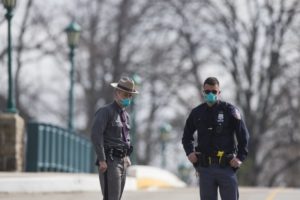How Police Departments are Facing COVID-19’s Impact on Public Safety
As the coronavirus continues to spread across the United States, 1.74M confirmed cases, 372K recovered, and 102K deaths according to WorldoMeter. Social distancing and stay at home orders have been implemented across the country, while there are some states who are beginning to return to regular daily functioning. One thing that has remained the same throughout the uprising of this pandemic, is that many “essential workers” and first responders remain in their jobs, taking on active roles in their communities, while putting their own selves at risk. These essential workers and first responders consist of doctors, nurses, farmworkers, cleaners, grocery store workers and transportation workers, as well as those people employed by police departments, whose duties have shifted to strictly enforce social distancing.

According to Chicago Interim Police Superintendent Charlie Beck, “We have always been more at risk for violence because of our profession and now I think we are more at risk of [the] virus because of our profession.” Amongst the pandemic, law enforcement officers are trying to create a balance between protecting citizens and protecting themselves. According to Time, Sheriff Daron Hall, President of the National Sheriff’s Association and Sheriff of Davidson County, Tennessee stated that “Our world is law enforcement and right now we’re trying to balance public safety and public health.”
Across the United States, states are getting serious about making sure people are keeping their distance during the coronavirus pandemic and if not, certain consequences will have to be paid. An example of the restrictions being implemented by many states is exemplified by the following list of regulations in place in Virginia as of March 24th, according to NBC12:
- Entertainment and recreation venues must close.
- Non-essential businesses that cannot abide by the recommended six feet of social distancing must close.
- Food and drink establishments must limit their service to carryout, curbside, or delivery.
- Non-essential brick and mortar stores may stay open as long as they limit capacity to 10 patrons at a time.
- Essential businesses, such as grocery stores and medical and health establishments, may stay open but must practice social distancing and enhanced hygienic precautions.
In order to promote resilience, law enforcement workers are making sure that the executive orders given by the governor of their state are obeyed by civilians. By ensuring the safety of individuals, police officers can help enhance community resilience and foster a culture of preparedness and resourcefulness to face future disruptions from COVID-19.
This is a public health crisis. This is about public safety. And as a public safety organization, police departments are going to do their part to make sure civilians stop this viral outbreak as soon as possible.
Sources and Further Reading:
